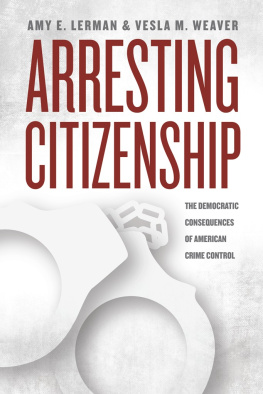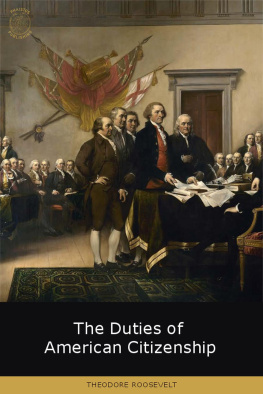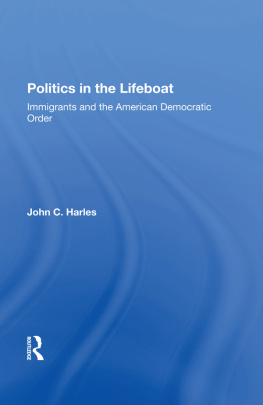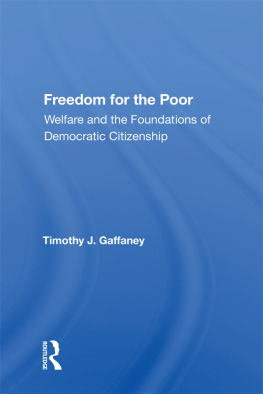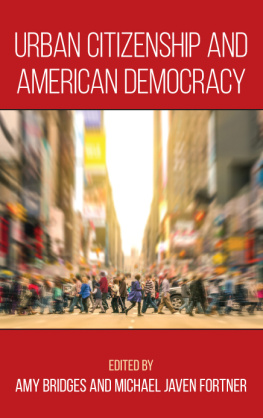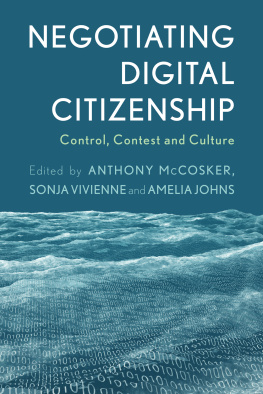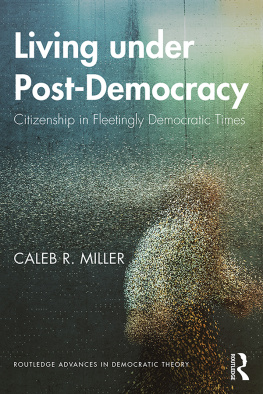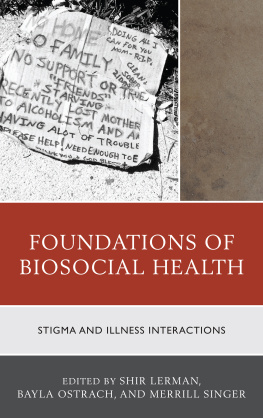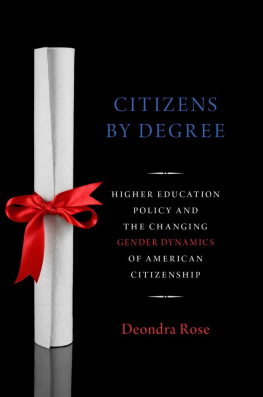AMY E. LERMAN is assistant professor in the Goldman School of Public Policy at the University of California, Berkeley, and the author of The Modern Prison Paradox.
VESLA M. WEAVER is assistant professor in the Department of African American Studies and the Department of Political Science at Yale University. She is coauthor of Creating a New Racial Order.
The University of Chicago Press, Chicago 60637
The University of Chicago Press, Ltd., London
2014 by The University of Chicago
All rights reserved. Published 2014.
Printed in the United States of America
23 22 21 20 19 18 17 16 15 14 1 2 3 4 5
ISBN-13: 978-0-226-13766-7 (cloth)
ISBN-13: 978-0-226-13783-4 (paper)
ISBN-13: 978-0-226-13797-1 (e-book)
DOI: 10.7208/chicago/9780226137971.001.0001
Library of Congress Cataloging-in-Publication Data
Lerman, Amy E., 1978 author.
Arresting citizenship : the democratic consequences of American crime control / Amy E. Lerman and Vesla M. Weaver.
pages cm
(Chicago studies in American politics)
ISBN 978-0-226-13766-7 (cloth : alk. paper)
ISBN 978-0-226-13783-4 (pbk. : alk. paper)
ISBN 978-0-226-13797-1 (e-book)
1. Criminal justice, Administration ofUnited States. 2. Discrimination in criminal justice administrationUnited States. I. Weaver, Vesla M., 1979author. II. Title. III. Series: Chicago studies in American politics.
HV9950.L475 2014
364.973dc23
2013043364

This paper meets the requirements of ANSI/NISO Z39.48-1992 (Permanence of Paper).
Arresting Citizenship
The Democratic Consequences of American Crime Control
AMY E. LERMAN AND VESLA M. WEAVER
THE UNIVERSITY OF CHICAGO PRESS
CHICAGO AND LONDON
Chicago Studies in American Politics
A SERIES EDITED BY BENJAMIN I. PAGE, SUSAN HERBST, LAWRENCE R. JACOBS, AND ADAM BERINSKY
Also in the series:
HOW THE STATES SHAPED THE NATION: AMERICAN ELECTORAL INSTITUTIONS AND VOTER TURNOUT, 19202000 by Melanie Jean Springer
THE AMERICAN WARFARE STATE: THE DOMESTIC POLITICS OF MILITARY SPENDING by Rebecca U. Thorpe
CHANGING MINDS OR CHANGING CHANNELS? PARTISAN NEWS IN AN AGE OF CHOICE by Kevin Arceneaux and Martin Johnson
TRADING DEMOCRACY FOR JUSTICE: CRIMINAL CONVICTIONS AND THE DECLINE OF NEIGHBORHOOD POLITICAL PARTICIPATION by Traci Burch
WHITE-COLLAR GOVERNMENT: THE HIDDEN ROLE OF CLASS IN ECONOMIC POLICY MAKING by Nicholas Carnes
HOW PARTISAN MEDIA POLARIZE AMERICA by Matthew Levendusky THE POLITICS OF BELONGING: RACE, PUBLIC OPINION, AND IMMIGRATION by Natalie Masuoka and Jane Junn
POLITICAL TONE: HOW LEADERS TALK AND WHY by Roderick P. Hart, Jay P. Childers, and Colene J. Lind
THE TIMELINE OF PRESIDENTIAL ELECTIONS: HOW CAMPAIGNS DO (AND DO NOT) MATTER by Robert S. Erikson and Christopher Wlezien
LEARNING WHILE GOVERNING: EXPERTISE AND ACCOUNTABILITY IN THE EXECUTIVE BRANCH by Sean Gailmard and John W. Patty
ELECTING JUDGES: THE SURPRISING EFFECTS OF CAMPAIGNING ON JUDICIAL LEGITIMACY by James L. Gibson
FOLLOW THE LEADER? HOW VOTERS RESPOND TO POLITICIANS POLICIES AND PERFORMANCE by Gabriel S. Lenz
TO THE MANY WHO SHARED THEIR THOUGHTS AND EXPERIENCES WITH US FOR THIS BOOK, AND TO THE MILLIONS WHOSE VOICES HAVE NOT YET BEEN HEARD.
Contents
Acknowledgments
What does the expansion of the carceral state mean for citizens who experience punishment and surveillance? Over the past few years, answering this question has been our central ambition. It has led us on an intellectual journey that shaped us as scholars and people. It required us to go beyond the methods we were comfortable with to undertake an ethnography of custodial citizens. It required more imagination than we sometimes felt we had. It required us to learn how not to treat the topic at arms length, as we had become accustomed, but to spend a day in their shoes. We are indebted to an enormous number of people for their support, participation, ideas, and enthusiasm over the long road we have traveled toward completing this book.
This book was shaped first and most fundamentally by the many people who you will come to know shortly, who generously shared their experiences with us and let us in to their worlds. Their voices made a deep imprint on the theories and ideas we developed here. We wrote this book for their sake alone, because we believed their voices should be heard and their stories told. In the process, though, they made it impossible for us to forget that their unique experience of democracy revealed something deeper about the current character of the American polity. Their particular stories were about criminal justice but also about contemporary citizenship and democracy in America; one cannot be understood without the other. Even when we dont quote them, their thoughts and experiences are written on every page. It is to them that the book is dedicated.
We might never have met Silas, Darcy, Marshall, and the others had we not had the support of organizations that already knew and worked closely with them. These organizations not only helped us reach these folks, but sometimes offered us spaces to talk with them and helped to coordinate the comlex task of scheduling. Thanks in particular to Offender Aid and Restoration in Charlottesville and to Ross Carew; the Haven in Charlottesville; Albert Bo Robinson in Trenton and Helping Arms in Trenton, especially Cynthia Morgan and Ralph Fretz; and AmeriCorps in New Orleans. A very special thanks to Leonard Ward from the New Jersey State Parole Board, Tina Chiu from the Vera Institute of Justice, and also to Kathleen Whalen and the staff of the Partnership for Youth Development in New Orleans who helped to connect us to the people and organizations in their communities. The financial support of our institutions seeded our research; The Bobst Center at Princeton and the University of Virginia faculty research grants provided us with resources to conduct our interviews.
The conversations we had with individual interviewees were often deeply emotional experiences. We were equipped with two phenomenal graduate students, Meredith Sadin and Michelle Phelps, who not only had experience in interviewing, but had the intellectual and emotional mettle to undertake this endeavor with us. They traveled with us to Charlottesville and New Orleans and came ready with reserves of energy, passion, and ideas. They should read these pages knowing how central they were to this project.
There are some folks who not only read chapters when we called on them but who took an interest in our book before it could be called that. Vesla frequently went across the hall to her confidant, Melvin Rogers, who should have learned to close his door, but always was more than happy to discuss some concept or thought. The products of those many conversations, debates, and advice-giving are within these pages. We will never forget his off-the-cuff analogies, which pushed us to understand that democracy as a whole was harmed through the indignities our subjects faced. Chris Lebron was incredibly generous in time and spirit, reading every page, sometimes more than once or twice. We are grateful for the many(!) epiphanies the conversations with him helped inspire. His abiding excitement for the project along with his love of justice, critical eye, and penchant for prose crucially shaped not just the content, but also the scope of this project. His readership made the text less timid and the theoretical insights more precise, pushing us to recognize the crucial distinction between antidemocratic and undemocratic institutions.
 This paper meets the requirements of ANSI/NISO Z39.48-1992 (Permanence of Paper).
This paper meets the requirements of ANSI/NISO Z39.48-1992 (Permanence of Paper).
